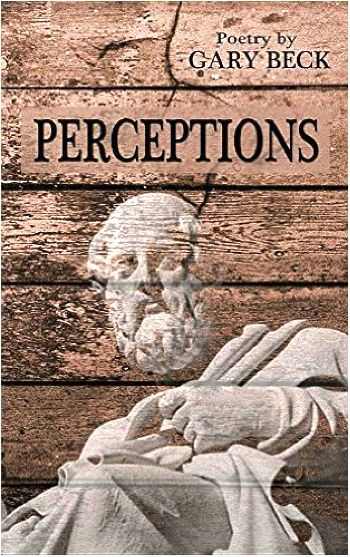Gary Beck, Perceptions
reviewed by Alison McBain

Perceptions Publisher: Winter Goose Publishing Date: June 13, 2016 Paperback: 146 pages ISBN: 1941058493; 9781941058497 |
Into the charged atmosphere of the lead-up to the U.S. election comes Gary Beck’s new collection of poetry. Perceptions is unapologetically political, examining such hot button topics as war, mass shootings, globalization, environmental destruction, homelessness, unemployment, social media, recessional economic collapse, Western versus non-Western countries, and the stranglehold of oil on America.
Mr. Beck doesn’t shy away from modern concerns but rather examines them head-on in a straightforward, narrative style. The poems tell stories of people caught in hopeless situations, people on opposing sides of the political spectrum, and people at war and killing each other. Mr. Beck’s message is seldom hidden, but is presented at the forefront of each poem; these are words meant to inform, to awaken.
The poems are searching for the future and finding things bleak. Overall, the message seems to be anti-trend, that the direction humanity is headed on is a collision course with disaster. Often, the conclusion of the poems is to observe worsening situations and then perhaps turn away from them, emphasizing that action can lead to disaster.
And yet inaction can also have the same effect. Knowledge only seems to bring despair, but ignorance is no better, waiting for disaster to happen — one of the paradoxes explored within the poems.
The style of the works is mostly free verse, with a few rhymed poems thrown in for variety. Most of the poems are short, one page or less, although there are a few longer ones. There are some common motifs throughout: birds (especially doves), the Internet, soldiers in Iraq, oil, images of the sea and sea life, Manhattan, and space exploration.
I really relished the poems about space, since one of my first loves is science fiction. And I’ve always been a fan of the Beatles, so I enjoyed “Across the Universe,” which combined the two.
NASA sent the Beatles song
“Across the Universe,”
to the North Star, Polaris,
431 light-years away
via the Deep Space Network
of multiple antennas.
One of the surviving Beatles
sent his love to the aliens,
leaving us to wonder
what they might send back.
While the overall tone of the book is serious, there are some touches of humor, like the above poem. There are several clever plays on titles, such as “For Whom the Cash Flows,” which is a poem about the rich getting richer.
Although most of the poems are concerned with the political world, others look at the physical and natural world, and how human callousness is leading to our own demise. There are also brief forays into commentary on science, art and nature.
Because of the election coming up, I feel I must mention that some of the poems seem to have foretold events that occurred after its publication. For example, the ending stanza of “The Changing World”:
But honest citizens
as well as criminals
are suspicious of cops,
the only opposition
to cartels, rogue states, terror,
and much of the world
does not appreciate
gifts of safety,
made at horrendous cost
to our conflicted land.
While the poem is speaking in reference to America being a policeman to the world, it strongly brought to mind the recent, very public shootings of policemen which occurred after this book was published. Also, in “Future War”:
But there are no parades for cops
for keeping our streets safe
and those who do their duty
no longer feel respected.
Unfortunately, those words are proving prophetic.
Mr. Beck also touches on past and current American politics with “Paradox III”:
just before the Civil War,
a political party
emerged in the land,
the Know-Nothings.
Many flocked to their banner
because they proclaimed
contempt and intolerance
for arriving immigrants.
These words spoke to me as a reminder of the nature of events we think modern, but are shown to be part of longer-standing cycles. Despite America being a melting pot, intolerance of immigration is something that has occurred in the past, and will probably occur in the future.
The poem ends with a discussion of the future leaders of our nation.
We the people have little choice
but to rely on candidates
who may or may not be worthy
and the only way we’ll find out
will be after they mislead us,
another glaring weakness
of elective democracy.
I feel that the overall conclusion of this collection is that things are getting worse in the world. War, hate, violence and destruction are the products of human society. However, there are brief signs of hope: while the situation might be dismal, there seems to be a yearning for something better. I’ll end with one of my favorites of the collection, “Paradox VII”:
If beauty lies
in the eyes
of the beholder,
does it disappear
when the eyes are closed,
or when we stop looking?Can beauty exist
without mankind
to appreciate it,
or will it continue
without an audience,
aesthetically intact?
I would like to think that while things can get worse in the world, it also means that things can get better. Beauty exists, regardless of audience. Of course, the flip side is also true: humanity won’t always be able to observe the beauty they praise so highly. Beauty might exist, even when humanity does not. A bittersweet idea.
This collection speaks about opening one’s eyes to the problems around us, and I hope it is an eye-opener to its readers. It gave me plenty to think about long after I turned the last page. I enjoyed reading it, and I hope you will too.
Copyright © 2016 by Alison McBain

